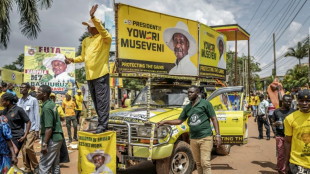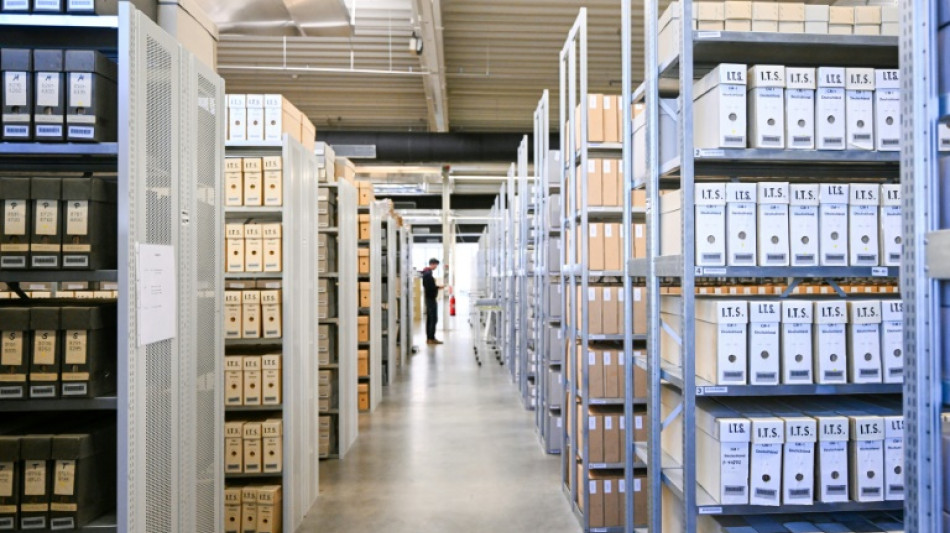
-
 Morocco coach Regragui laments 'shameful' scenes in AFCON final defeat
Morocco coach Regragui laments 'shameful' scenes in AFCON final defeat
-
Maye, Boutte wonder-catch carry Patriots past Texans

-
 Train collision in Spain kills 21, injures dozens
Train collision in Spain kills 21, injures dozens
-
Brazilians Abner, Endrick help Lyon climb to 4th in Ligue 1

-
 Barca beaten at Real Sociedad as Liga title race tightens
Barca beaten at Real Sociedad as Liga title race tightens
-
Socialist to face far-right candidate for Portugal's presidency

-
 Senegal stun hosts Morocco to win AFCON title after final walk-off protest
Senegal stun hosts Morocco to win AFCON title after final walk-off protest
-
Syria's leader agrees truce with Kurds after govt troops advance

-
 Morant shines as Grizzlies top Magic in London
Morant shines as Grizzlies top Magic in London
-
Real Sociedad end Barca winning streak to tighten Liga title race

-
 Senegal stun hosts Morocco to win AFCON title after ugly scenes mar final
Senegal stun hosts Morocco to win AFCON title after ugly scenes mar final
-
AC Milan in touch with Inter thanks to Fullkrug's first Serie A goal

-
 Lyon climb to fourth in Ligue 1 with victory over Brest
Lyon climb to fourth in Ligue 1 with victory over Brest
-
Morant shines as Grizzles top Magic in London

-
 Trump admin orders 1,500 troops to prepare for possible Minnesota deployment
Trump admin orders 1,500 troops to prepare for possible Minnesota deployment
-
Limited internet briefly returns in Iran after protest blackout

-
 South Africa declares national disaster as floods batter region
South Africa declares national disaster as floods batter region
-
Gang members in Guatemala kill seven police after prison crackdown: minister

-
 Villa's title bid rocked by Everton loss, Newcastle held at Wolves
Villa's title bid rocked by Everton loss, Newcastle held at Wolves
-
Dybala boosts Roma's Champions League hopes, Fiorentina honour Commisso

-
 Villa's title bid rocked by Everton loss, Newcastle held by Wolves
Villa's title bid rocked by Everton loss, Newcastle held by Wolves
-
'Avatar: Fire and Ash' at number one in N.America for fifth straight week

-
 Limited internet returns in Iran after protest blackout
Limited internet returns in Iran after protest blackout
-
Syria's leader agrees truce deal with Kurds after govt troops advance

-
 Smith's penalty sees Quins eliminate La Rochelle, Bordeaux secure top seeding
Smith's penalty sees Quins eliminate La Rochelle, Bordeaux secure top seeding
-
Atletico edge Alaves to strengthen Liga top-four hold

-
 Uganda president says opposition 'terrorists' in victory speech
Uganda president says opposition 'terrorists' in victory speech
-
New Zealand register first ODI series win in India despite Kohli ton

-
 Elvira wins Dubai Invitational after Lowry's last hole meltdown
Elvira wins Dubai Invitational after Lowry's last hole meltdown
-
Jeong snatches Union late draw at Stuttgart in Bundesliga

-
 Man Utd's Martinez hits back at Scholes after height jibes
Man Utd's Martinez hits back at Scholes after height jibes
-
Frank on the brink as Romero calls for unity amid Spurs 'disaster'

-
 Chile declares emergency as wildfires kill at least 15
Chile declares emergency as wildfires kill at least 15
-
Europe hits back at Trump tariff threat over Greenland

-
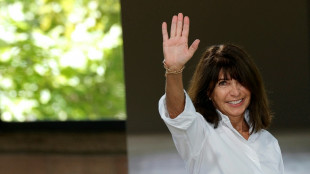 Men's Fashion Week in Paris: what to watch
Men's Fashion Week in Paris: what to watch
-
McGrath goes top of slalom standings with Wengen win

-
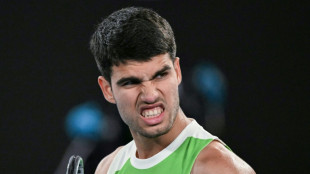 No Venus fairytale as Alcaraz, Sabalenka win Melbourne openers
No Venus fairytale as Alcaraz, Sabalenka win Melbourne openers
-
Iran considers 'gradually' restoring internet after shutdown
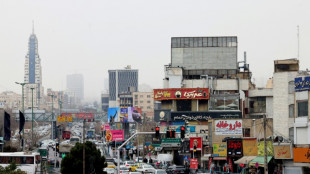
-
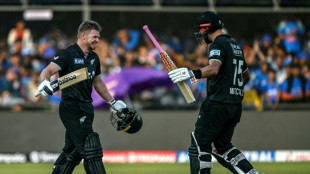 Mitchell, Phillips tons guide New Zealand to 337-8 in ODI decider
Mitchell, Phillips tons guide New Zealand to 337-8 in ODI decider
-
Flailing Frankfurt sack coach Toppmoeller
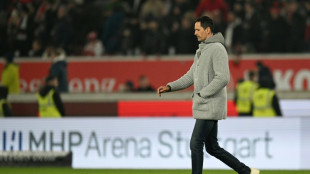
-
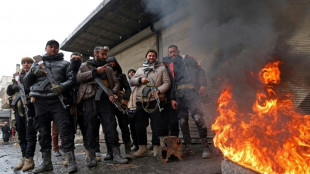 Kurdish forces withdraw from Syria's largest oil field as govt forces advance
Kurdish forces withdraw from Syria's largest oil field as govt forces advance
-
'Proud' Venus Williams, 45, exits Australian Open after epic battle

-
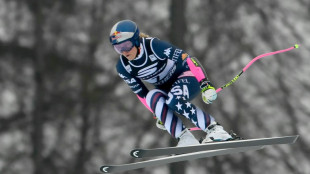 Vonn in Olympic form with another World Cup podium in Tarvisio super-G
Vonn in Olympic form with another World Cup podium in Tarvisio super-G
-
Alcaraz kicks off career Grand Slam bid with tough Australian Open test
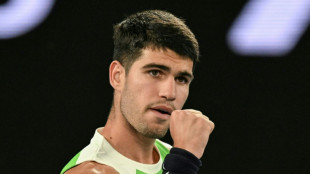
-
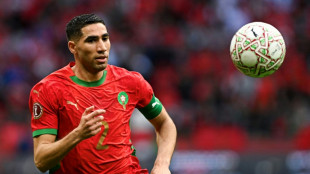 Hosts Morocco face Mane's Senegal for AFCON glory
Hosts Morocco face Mane's Senegal for AFCON glory
-
Europe scrambles to respond to Trump tariff threat
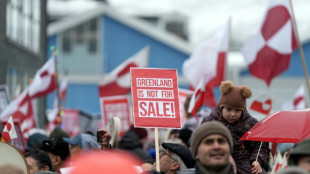
-
 Venus Williams, 45, exits Australian Open after epic battle
Venus Williams, 45, exits Australian Open after epic battle
-
Taiwan's Lin wins India Open marred by 'dirty' conditions

-
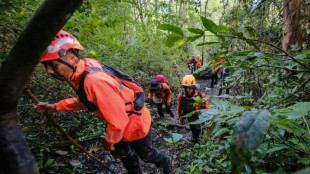 Indonesia rescuers find body from plane crash
Indonesia rescuers find body from plane crash
-
Kurdish-led forces withdraw from Syria's largest oil field: monitor
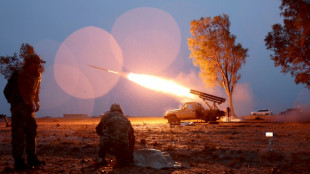

German archive where victims of the Nazis come back to life
If it wasn't for the Arolsen Archives, half-sisters Sula Miller and Helen Schaller would never have met.
American Miller and German Schaller only recently discovered they had the same father -- a Holocaust survivor who emigrated to the US.
Miller "contacted us because she was looking for information about her father", said Floriane Azoulay, director of the Arolsen Archives, the world's largest repository of information on the victims and survivors of the Nazi regime.
Mendel Mueller, a Jew born in the Austro-Hungarian Empire, was incarcerated in two Nazi concentration camps: Buchenwald in northern Germany and Auschwitz in what was then occupied Poland.
An investigation of the archives revealed he had another daughter, Helen, who was still alive and living in Germany.
"Thanks to us, the two women got to know each other," Azoulay said.
Eighty years after the end of World War II, people all over the world are still discovering the fate of their family members sent to Adolf Hitler's Nazi death camps.
The vast Arolsen Archives, located in the quaint spa town of Bad Arolsen in central Germany, contain millions of documents and objects.
When Miller contacted the archive to find out about her father, researchers stumbled upon a 1951 letter from his wife looking for his whereabouts.
Shortly after the war, Mueller had married a German woman -- the mother of his daughter Helen, born in 1947.
But some time later, he left for the US without her and started a new life there, marrying an Austrian woman -- who gave birth to Sula in 1960.
Four years after Miller's initial inquiry, investigators from Bad Arolsen managed to track Helen down and the two sisters met for the first time last year.
"Their physical resemblance was striking," Azoulay said.
The two had complicated and conflicting views on their father, but "their meeting helped them make peace with the past", she said.
- Watches, wallets and rings -
Although 90 percent of the material held by the Arolsen Archive has now been digitised, the complex still stores some 30 million original documents on almost 17.5 million people.
There are also thousands of items such as watches, rings and wallets collected from the old Nazi camps.
The archive was originally set up by the Allies in early 1946 as the International Tracing Service to help people find relatives who had disappeared during the war.
It mostly dealt with Jews but also Roma, homosexuals, political dissidents and "racially pure" children kidnapped by the Nazis as part of a programme to address the falling birth rate.
Bad Arolsen was chosen because it had escaped Allied bombing and had a working telephone network, and because of its location at the centre of Germany's four occupation zones (French, American, British and Soviet).
At first the service was run by a curious mix of members of the Allied forces, Holocaust survivors from all over Europe and Germans -- including former members of the Nazi party.
But from the 1950s onwards, as many of the survivors left the country, German staff numbers increased.
Today, the archive has around 200 employees, assisted by some 50 volunteers around the world.
And it is still handling around 20,000 enquiries per year, according to Azoulay, often from children or grandchildren of victims or survivors who want to know what happened to them.
Like Abraham Ben, born to Polish-Jewish parents in a displaced persons camp in Bamberg, southern Germany, in May 1947.
- No grandparents -
Now almost 80, Ben is still hoping to shed light on the fate of his father's family, who were left behind when he escaped from the Warsaw Ghetto.
"There is a high probability that they died in the camps," he said.
Ben's father "never talked about (the Holocaust)... and we never asked him about it. We felt it was too painful for him."
Almost no one had grandparents in the centre for Jewish refugees where Ben was born because the elderly -- too weak to work -- were first to be killed in the camps.
"At the age of 10, I realised other children had grandparents because I went to a German school and my classmates would describe the gifts they had given them at Christmas."
Ben said he is hoping to find "cousins who may have survived" among the children of his father's five brothers and sisters.
The archives at Bad Arolsen include documents issued by the Nazi party, such as Gestapo arrest warrants, lists of people to be transported to the camps and camp registers.
The documents are often surprisingly detailed, given the low chances of survival of the people listed in them.
In Buchenwald, the camp register kept a record of every prisoner's height, eye and hair colour, facial features, marital status, children, religion and which languages they spoke, as well as their name, date of birth and deportation number.
- 'Best day of her life' -
From the beginning, the records were sorted according to a phonetic alphabet, since the same name can be spelled differently in different languages.
"For example, there are more than 800 ways to write 'Abrahamovicz'," said Nicole Dominicus, head of archive administration.
Later the archives were expanded to include files compiled by the Allies, as well as correspondence between the Red Cross and the Nazi administration.
The files also contain letters written by people searching for their lost relatives.
In a letter written to the International Tracing Service in 1948, a mother who survived Auschwitz asks about her missing daughter, who she was separated from in the camp.
Volunteers working for the archives outside Germany also help trawl through records in other countries.
Manuela Golc, a volunteer in Poland, recently met a 93-year-old woman to hand over a pair of earrings and a watch that had belonged to her mother, who was deported in 1944 after the Warsaw Uprising.
"She told me it was the best day of her life," Golc said, with tears in her eyes.
German Achim Werner, 58, was "shocked" when the archives contacted him to let him know they had his grandfather's wedding ring, taken from him when he arrived at the Dachau concentration camp.
Werner had visited the camp near Munich several times, on school excursions and as an adult, without knowing that his grandfather had been held there.
"We knew that he was detained in 1940, but nothing after that," he said.
Werner does not know why his grandfather was imprisoned, and since the archives have no further information about him, he probably never will.
But he wants to keep the man's memory alive and has given the wedding ring to his daughter.
"She will wear it as a pendant and then pass it on to her children," he said.
M.Vogt--VB




